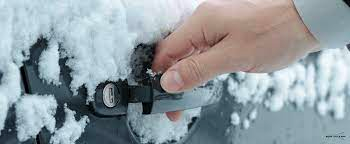Winter’s arrival brings with it a host of challenges, and one of the most frustrating is dealing with frozen locks. Whether you’re trying to unlock your front door, car, or shed, a frozen lock can quickly turn a routine task into a time-consuming ordeal. In this article, we will explore common causes of frozen locks in winter and share expert tips from locksmiths in Vaughan on how to prevent and deal with this inconvenience.
Understanding the Causes
Before diving into solutions, it’s essential to understand why locks freeze in the first place. Several factors contribute to this common winter problem:
Temperature Drops: When temperatures plummet, the moisture in the air can freeze on the exterior of locks, making them difficult or impossible to operate.
Condensation: Locks can accumulate condensation throughout the day, which can freeze overnight when temperatures drop.
Snow and Ice: Snow and ice can accumulate around locks, making them inaccessible without the proper precautions.
Lack of Lubrication: Locks that lack proper lubrication are more prone to freezing as friction increases, making it easier for moisture to accumulate.
Now that we know what causes frozen locks let’s explore some expert tips on preventing and dealing with them.
Preventative Measures
Lubrication: Locksmiths in Vaughan emphasize the importance of keeping your locks well-lubricated. Apply a silicone-based lubricant to the lock mechanism, ensuring it penetrates deep within the lock to reduce friction. Regular lubrication not only prevents freezing but also extends the lifespan of your lock.
Weather Stripping: Installing weather stripping around your doors can help keep moisture and cold air out of your home, reducing the chances of your locks freezing. Properly sealed doors create a barrier against the elements.
Anti-Freeze Lock Deicer: Consider using an anti-freeze lock deicer. These products are specifically designed to prevent locks from freezing in cold temperatures. Apply the deicer before the temperature drops to provide a protective barrier.
Protective Covers: Invest in protective lock covers that shield your locks from the elements. These covers are designed to prevent moisture and ice from coming into direct contact with the lock, reducing the chances of freezing.
Dealing with Frozen Locks
Despite your best preventive efforts, there may still be occasions when you find yourself faced with a frozen lock. Here’s what you can do:
Gentle Heat: Apply gentle heat to the lock using a hairdryer on the lowest heat setting. Make sure not to use high heat, as it can damage the lock or cause the moisture to expand and worsen the problem.
Lock Deicer: If you have a lock deicer on hand, use it as directed. Lock deicers typically contain alcohol or other ingredients that can melt the ice without harming the lock mechanism.
Warm Key: Heat your key using a lighter or by dipping it into warm water (not boiling). Carefully insert the warm key into the lock and turn it gently. The warmth can help melt the ice within the lock.
Graphite Lubricant: If the lock remains stuck after using heat or a deicer, locksmiths in Vaughan recommend using a graphite lubricant designed for locks. Graphite is an excellent dry lubricant that can help reduce friction and make it easier to turn the key.
Call a Professional Locksmith: If all else fails, it’s time to call in the professionals. A locksmith in Vaughan can quickly and safely assess the situation, employing their expertise and specialized tools to address the frozen lock without causing any damage.
Expert Insights from Locksmiths in Vaughan
We reached out to some experienced locksmiths in Vaughan to get their insights on dealing with frozen locks in winter. Here’s what they had to say:
Regular Maintenance: “One of the most common reasons locks freeze is due to a lack of maintenance. Regularly lubricate your locks and make sure they are in good working condition. This simple step can save you from a lot of winter lock troubles,” says John from Vaughan Lock & Key.
Quality Locks: “Invest in quality locks with weather-resistant features. High-quality locks are less likely to freeze and provide better security for your home or property,” recommends Sarah from Locksmiths Vaughan.
Emergency Services: “Don’t hesitate to call a locksmith when you encounter a frozen lock. We have the tools and experience to safely resolve the issue, and we can also provide advice on how to prevent it from happening again,” advises Mark from Vaughan’s Lock & Safe.
Conclusion
Dealing with frozen locks during winter can be a frustrating experience, but it’s a challenge that can be mitigated with the right preventive measures and knowledge. By understanding the causes of frozen locks and following expert tips from locksmiths in Vaughan, you can keep your locks functioning smoothly even in the harshest winter conditions. Remember that regular maintenance, proper lubrication, and the use of deicing products can go a long way in preventing lock-related inconveniences. And in those rare cases when you’re faced with a frozen lock you can’t handle on your own, don’t hesitate to call a professional locksmith in Vaughan to ensure a swift and secure resolution.









































